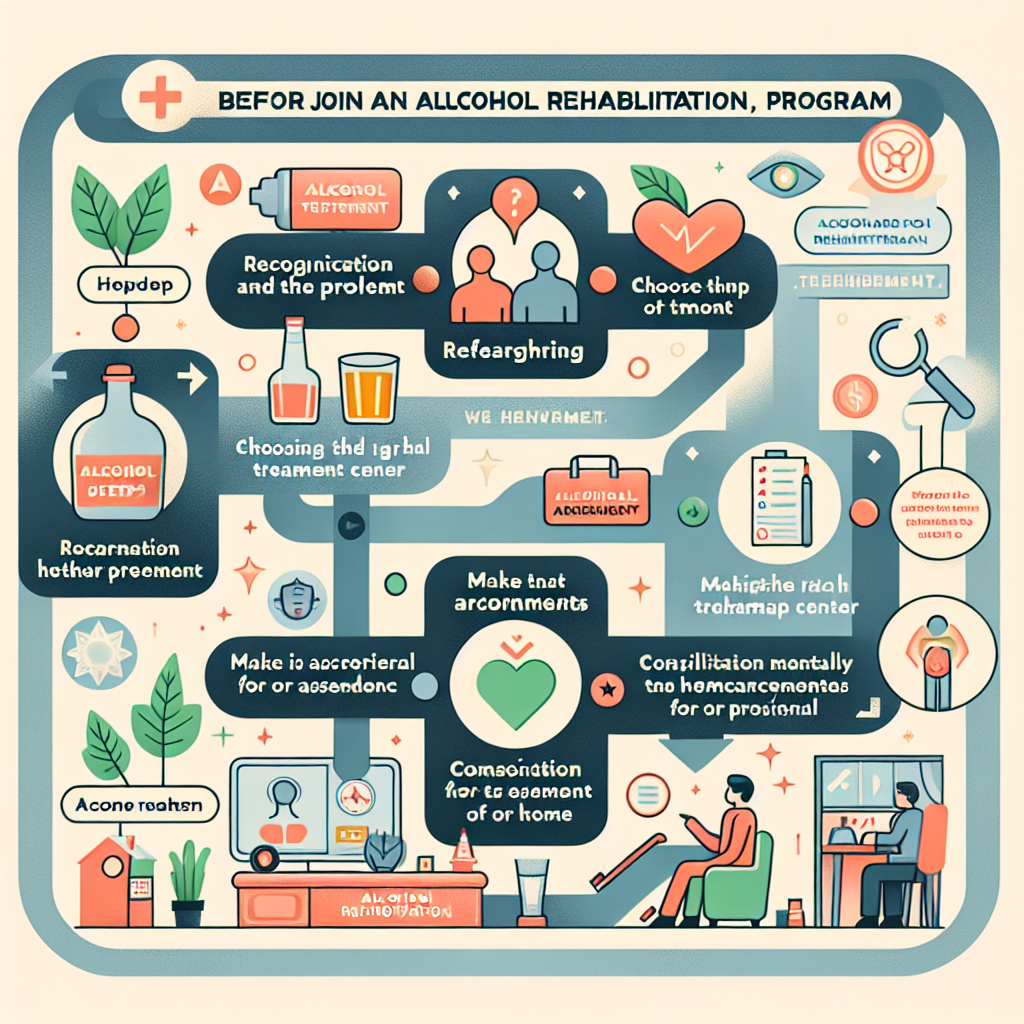-
Table of Contents

“Prepare, Commit, Transform: Your Journey to Sobriety Begins Here”
Introduction
Entering alcohol rehab is a significant and courageous step towards recovery and a healthier life. However, preparation is crucial to ensure the process is as smooth and effective as possible. Before embarking on this journey, it is essential to take several preparatory steps. These include acknowledging the problem, seeking professional advice, understanding the different types of rehab programs available, arranging for time off work or other responsibilities, securing financial arrangements, and preparing emotionally and mentally for the challenges ahead. By taking these steps, individuals can better position themselves for a successful and transformative rehab experience.
Preparing Mentally And Emotionally For Alcohol Rehab
Preparing mentally and emotionally for alcohol rehab is a crucial step in the journey toward recovery. It is essential to approach this transformative process with a clear mind and a determined spirit. One of the first steps to take is to acknowledge the need for help. Admitting that you have a problem with alcohol and that you need professional assistance is a significant milestone. This acceptance can be challenging, but it is the foundation upon which your recovery will be built.
Once you have acknowledged the need for rehab, it is important to educate yourself about the process. Understanding what to expect can alleviate some of the anxiety and fear associated with entering rehab. Research the different types of rehab programs available, such as inpatient and outpatient options, and consider which one might be the best fit for your needs. Speak with healthcare professionals, counselors, or individuals who have gone through rehab to gain insights and perspectives. This knowledge will empower you and help you feel more prepared for the journey ahead.
Another vital step is to set realistic expectations. Recovery is a gradual process, and it is essential to recognize that there will be challenges along the way. Setting achievable goals can provide a sense of direction and purpose. For instance, instead of aiming for complete sobriety immediately, focus on smaller milestones, such as attending all therapy sessions or completing a week without alcohol. Celebrating these small victories can boost your confidence and motivation.
In addition to setting goals, it is crucial to build a support system. Surround yourself with people who understand your struggle and are willing to support you through the process. This could include family members, friends, or support groups. Having a network of individuals who can offer encouragement, listen to your concerns, and provide accountability can make a significant difference in your recovery journey. Moreover, consider seeking the guidance of a therapist or counselor who specializes in addiction. Professional support can provide you with coping strategies and tools to manage cravings and triggers.
As you prepare for rehab, it is also important to address any underlying emotional issues. Many individuals turn to alcohol as a way to cope with stress, trauma, or other emotional pain. Identifying and confronting these issues can be a crucial part of the healing process. Journaling, meditation, or engaging in creative activities can help you explore and express your emotions. Additionally, practicing mindfulness and self-compassion can foster a positive mindset and reduce feelings of guilt or shame.
Furthermore, taking care of your physical health can have a positive impact on your mental and emotional well-being. Prioritize activities that promote physical wellness, such as regular exercise, a balanced diet, and adequate sleep. Physical activity, in particular, can release endorphins, which are natural mood lifters. A healthy body can support a healthy mind, making it easier to cope with the challenges of rehab.
Finally, it is essential to cultivate a sense of hope and optimism. Believe in your ability to overcome addiction and envision a future where you are free from the grip of alcohol. Visualizing your goals and the positive changes that sobriety will bring can inspire you to stay committed to the process. Remember that recovery is a journey, and every step you take brings you closer to a healthier, more fulfilling life.
In conclusion, preparing mentally and emotionally for alcohol rehab involves acknowledging the need for help, educating yourself about the process, setting realistic goals, building a support system, addressing underlying emotional issues, taking care of your physical health, and cultivating hope. By taking these steps, you can approach rehab with confidence and determination, paving the way for a successful recovery.
Organizing Personal And Professional Affairs Before Alcohol Rehab
Entering alcohol rehab is a significant and courageous step towards reclaiming one’s life from the grips of addiction. However, before embarking on this transformative journey, it is essential to organize both personal and professional affairs to ensure a smooth transition and a focused recovery. By taking these preparatory steps, individuals can alleviate potential stressors and fully commit to their rehabilitation process.
First and foremost, it is crucial to inform close family members and friends about the decision to enter rehab. This not only provides emotional support but also helps in delegating responsibilities that may need attention during the absence. Open communication with loved ones can foster a supportive environment, which is vital for long-term recovery. Additionally, discussing the duration of the rehab program and any potential aftercare plans can help set realistic expectations and prepare everyone involved for the journey ahead.
Next, addressing professional obligations is equally important. Informing your employer about the need for time off due to medical reasons is a necessary step. Many workplaces offer medical leave or short-term disability benefits that can be utilized during this period. It is advisable to provide a clear timeline and, if possible, arrange for a temporary replacement or delegate tasks to colleagues to ensure that work responsibilities are managed in your absence. This proactive approach not only maintains professional integrity but also reduces anxiety about work-related issues while in rehab.
Financial matters should also be carefully considered before entering rehab. Ensuring that bills are paid and financial obligations are met can prevent unnecessary stress during the recovery process. Setting up automatic payments for recurring expenses, such as rent, utilities, and loan payments, can be a practical solution. Additionally, informing financial institutions about your temporary unavailability can help in managing any unforeseen issues that may arise. If necessary, seeking assistance from a trusted family member or financial advisor can provide peace of mind and allow you to focus entirely on your recovery.
Moreover, it is essential to take care of any legal matters that may require attention. This includes updating legal documents, such as wills or power of attorney, and ensuring that any ongoing legal proceedings are addressed. Consulting with a legal professional can provide clarity and guidance on how to manage these affairs effectively.
In addition to these practical steps, preparing emotionally and mentally for rehab is equally important. Engaging in self-reflection and setting personal goals for recovery can create a positive mindset. Understanding that rehab is a time for healing and growth can help in embracing the process wholeheartedly. It may also be beneficial to seek support from a therapist or counselor before entering rehab to address any underlying emotional issues and to develop coping strategies.
Furthermore, organizing personal belongings and creating a comfortable living space for post-rehab life can contribute to a smoother transition. This may include decluttering your home, stocking up on healthy food, and creating a serene environment that promotes well-being. Having a supportive and nurturing space to return to can significantly enhance the recovery experience.
In conclusion, taking the time to organize personal and professional affairs before entering alcohol rehab is a crucial step towards a successful recovery. By addressing these practical matters, individuals can reduce stress and create a supportive environment that fosters healing. With careful planning and a positive mindset, the journey to sobriety can be approached with confidence and determination, paving the way for a healthier and more fulfilling life.
Q&A
1. **Question:** What is the first step to take before entering alcohol rehab?
**Answer:** The first step is to acknowledge the problem and make a commitment to seek help.
2. **Question:** What should you do to prepare for the logistics of entering alcohol rehab?
**Answer:** Arrange for time off work, organize childcare or pet care, and ensure financial and legal matters are in order.
Conclusion
Before entering alcohol rehab, it is crucial to take several preparatory steps to ensure a successful recovery journey. First, acknowledge the problem and commit to seeking help. Next, research and choose a suitable rehab facility that meets your specific needs, considering factors such as treatment programs, location, and cost. Consult with healthcare professionals for medical advice and undergo a thorough medical evaluation to address any underlying health issues. Inform your employer, family, and friends about your decision to seek treatment, and arrange for any necessary leave from work or other responsibilities. Secure your finances and make arrangements for bills and other obligations during your absence. Finally, mentally prepare yourself for the challenges ahead by setting realistic goals and maintaining a positive mindset. Taking these steps can significantly enhance the effectiveness of the rehab process and support long-term recovery.



